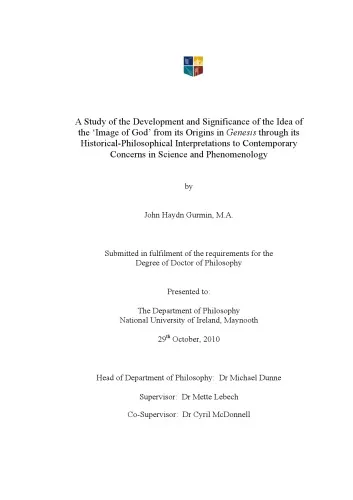A Study of the Development and Significance of the Idea of the ‘Image of God’ from its Origins in Genesis through its Historical-Philosophical Interpretations to Contemporary Concerns in Science and Phenomenology
4.5
Reviews from our users

You Can Ask your questions from this book's AI after Login
Each download or ask from book AI costs 2 points. To earn more free points, please visit the Points Guide Page and complete some valuable actions.Introduction
The concept of the "Image of God" has served as one of the most profound and influential ideas in the history of human thought. From its origins within the sacred texts of Genesis to its subsequent interpretations by theologians, philosophers, and scientists, this notion has shaped the cultural, moral, and existential identity of humanity. A Study of the Development and Significance of the Idea of the ‘Image of God’ explores this multifaceted concept, tracing its journey across millennia, diverse disciplines, and evolving paradigms.
This book is a comprehensive examination not only of the biblical and historical roots of the "Image of God" but also of its powerful interdisciplinary relevance today. While many studies have been limited to theological perspectives, this work bridges gaps between theology, philosophy, science, and phenomenology, showcasing how this ancient concept continues to inspire and challenge contemporary understandings of human potential, freedom, and dignity.
By analyzing various interpretations of the "Image of God," the book offers insight into how this idea has been redefined over time, reflecting shifting human concerns. From classical thinkers such as Augustine and Aquinas to modern philosophers like Immanuel Kant and the existentialists, the "Image of God" has mirrored humanity's enduring quest for meaning. Even more compelling is its transition into contemporary discourse, where fields like genetics, artificial intelligence, and phenomenology grapple with its implications for personhood, ethics, and technology.
This introduction outlines the key elements of the book, providing readers with a roadmap to understanding the depth and breadth of ideas explored within its pages. Below, you'll find a detailed summary, key takeaways, excerpts of some memorable quotes, and an explanation of why this book is significant in today's world.
Detailed Summary of the Book
The book is divided into three primary sections, each addressing a specific dimension of the "Image of God":
- Part I: Biblical Foundations: This section explores the origins of the concept within the Genesis narrative. By examining the Hebrew term "tselem Elohim" ("Image of God") within its historical and cultural contexts, readers gain a foundation for understanding how early Israelite thought conceptualized human uniqueness in creation.
- Part II: Historical and Philosophical Interpretations: Here, the book surveys how the "Image of God" has been interpreted across various epochs, from Patristic theology and scholasticism to Enlightenment-era philosophy. Special attention is given to the dynamic tensions between spiritual and physical interpretations of the image.
- Part III: Contemporary Concerns: The final section addresses how the "Image of God" intersects with modern science (particularly in genetics and artificial intelligence) and phenomenology. These chapters probe into issues of human identity, technological ethics, and the ongoing search for meaning in an increasingly mechanized world.
By the end, readers will have traversed a diverse intellectual landscape, gaining an appreciation for how the idea of the "Image of God" has shaped and been shaped by human inquiry.
Key Takeaways
- The "Image of God" provides a theological foundation for universal human dignity and moral responsibility.
- Throughout history, interpretations of the concept often reflect broader philosophical or cultural shifts (e.g., spiritual dualism, rational autonomy, existential freedom).
- Modern advances in science and technology, such as AI and genetic engineering, demand a re-evaluation of the idea of human uniqueness and responsibility.
- Phenomenological approaches to understanding what it means "to be" human extend the "Image of God" beyond traditional frameworks of thought.
Famous Quotes from the Book
"The 'Image of God' is not merely a static attribute but a dynamic calling, one that invites humanity into participation with creation, morality, and transcendence."
"To inquire into the 'Image of God' is not simply to ask about humanity’s distinction, but to confront the very reality of what it means to be human."
Why This Book Matters
In a world deeply affected by rapid technological and social change, the exploration of what it means to be human has never been more critical. The notion of the "Image of God," while ancient, remains indispensable for addressing contemporary ethical, existential, and scientific questions. This book not only provides a rich historical and philosophical grounding but also connects this timeless idea to the challenges and opportunities of the modern age.
Whether you are a theologian seeking clarity, a philosopher pondering human identity, or a scientist navigating the ethical implications of your work, this book invites you into a dialogue that transcends disciplines. By bridging the past and present, tradition and innovation, readers will emerge with a deeper understanding of themselves and the world they inhabit.
Free Direct Download
You Can Download this book after Login
Accessing books through legal platforms and public libraries not only supports the rights of authors and publishers but also contributes to the sustainability of reading culture. Before downloading, please take a moment to consider these options.
Find this book on other platforms:
WorldCat helps you find books in libraries worldwide.
See ratings, reviews, and discussions on Goodreads.
Find and buy rare or used books on AbeBooks.
1309
بازدید4.5
امتیاز50
نظر98%
رضایتReviews:
4.5
Based on 0 users review
"کیفیت چاپ عالی بود، خیلی راضیام"
Questions & Answers
Ask questions about this book or help others by answering
No questions yet. Be the first to ask!


